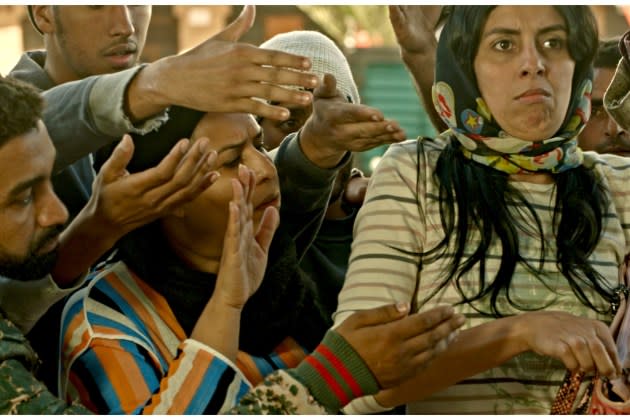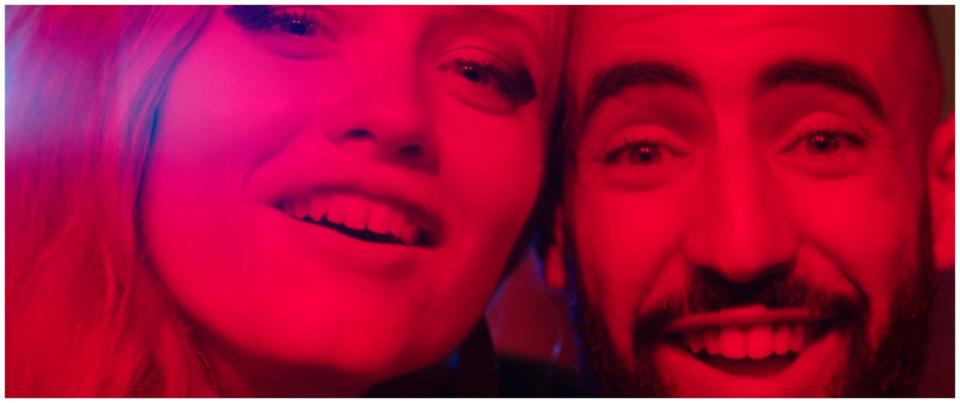Moroccan Director Hicham Lasri Talks About ‘Moroccan Badass Girl,’ ‘Happy Lovers,’ Black Comedies Centering on Antiheroes
- Oops!Something went wrong.Please try again later.
- Oops!Something went wrong.Please try again later.
- Oops!Something went wrong.Please try again later.

Moroccan director Hicham Lasri (“The End,” “Headbang Lullaby”) is presenting the world premiere of his seventh feature film, “Moroccan Badass Girl,” at the Marrakech Film Festival, and also participating in the Atlas Workshops with “Happy Lovers.” He describes both as dark comedies about antiheroes in the Arab world, “a bit in the vein of the Coen brothers.”
“Moroccan Badass Girl,” starring Fadoua Taleb, is a contemporary low-budget pic about a headstrong, unpredictable young Moroccan woman in Casablanca. “Happy Lovers” features a clumsy French writer who accepts a mission to kill a well-known author, with a fatwa on his head.
More from Variety
Michel Franco's 'Memory,' Starring Jessica Chastain, Sold by the Match Factory to Key Territories
'Mudbound' Director Dee Rees to Tackle 'Experimental' Dark Comedy: 'Film Should Be a Gamble'
Both projects mark a major change from Lasri’s previous six feature films, which have all been set in Morocco in the 1980s, at the end of the so-called “Years of Lead,” during the reign of King Hassan II.
“Moroccan Badass Girl” is produced by Lasri through S.A. Prod., with sales handled by MAD Solutions.
“Happy Lovers” is produced by Lamia Chraibi at La Prod, and is coproduced with her French production company Moon a Deal Films and Philippe Gompel’s Manny Films.
Chraibi has produced all Lasri’s main projects to date and is also prepping a pan-Arab supernatural series “Meskoun” with him.
Lasri talked with Variety about his projects.

What attracted you to these two projects?
I wanted to try something different. It took me over three years to make “Moroccan Badass Girl” and I’ve been developing “Happy Lovers” for almost a decade. I was born in 1977 so my previous films, set in the 1980s, involved expanding the memories of my childhood. But now I’m a father with two kids, and I’ve become interested in different kinds of stories. I wanted to try out a different genre. Both films are black comedies, a bit in the vein of the Coen brothers.
There has been a six-year gap since your last film, “Headbang Lullaby.”
I was suffering a kind of blacklisting problem. A lot of people disliked my previous films because I was free. I was called the punk Arab director. This was after the Arab Spring and the new government in Morocco was controlled by the Islamist party, and had a very conservative outlook. I had a public fight with some important figures. You had to agree with them or they would sideline you. But times and politics change. For me it was all part of my journey as an artist.
So you say “Moroccan Badass Girl” is a comedy?
Yes, it’s my first real comedy – a black comedy about the white city of Casablanca. It’s also the first time that my main character is a woman. The challenge is how to make it interesting and also realistic: how do women feel in Casablanca in the street.
My first film, “The End,” was a song about death, about the end of things, so it was slow-paced. This film is very, very hectic. It’s a bumpy ride for the character, and also for the audience. The city gave us a lot of miracles, in terms of lighting, people, things happening while we were shooting. You feel immersed in the city.
Casabalanca is a key character?
That’s true not just of my films, but also my novels and graphic novels. When people come to Casablanca for the first time they often don’t like it, because it’s rough, like New York. For me, you have to view the city a bit like free jazz. You need to get the tune. Otherwise you just feel there’s too much aggression, tension and violence.
Given that “Happy Lovers” is about a fatwa, has it been difficult to raise funding?
It’s my first French-language film and the main character is a Frenchman. But yes, it’s been tough to raise funding because people are afraid of the subject matter.
Where is “Happy Lovers” set?
We’ve shot it in Morocco but making it look like a generic southern European city, such as Marseille. The sound is very important. The story is set in 1993, before cell phones and the Internet.
What’s the film’s theme?
I want it to be a fable about the loss of civilization, about someone who defends freedom of speech, until he realizes he can earn money from suppressing it. It’s about how people try to take advantage of others because they don’t have the choice, because they are in survival mode, acting out of despair.
Who is the main character?
He’s a struggling French writer, married to a Moroccan girl. They’re expecting a baby and have little money. He accepts to kill a famous author for the money on his head. He’s an antihero. He’s very clumsy, but he’s not a killer, he’s not your typical criminal. In Arab Cinema, we don’t fully understand the concept of the antihero. We’re stuck in the idea of the victim and social misery. I’ve always been interested in the antihero, people not accepting their fate or suffering from something, fighting against it and creating new things.
It is a dark comedy?
Yes, above all, it explores absurdity. You know it’s a bit like what Bunuel said: That absurdity exists in my films through the presence of chickens! There is a nod to Kafka and to Mikhail Kalatozov’s “I Am Cuba.” Art can create a more interesting place. It’s not just about agreeing or disagreeing — because everyone agrees that violence is bad.
Who is the author who has received a fatwa?
He is a controversial author, Rahman, but we don’t know his nationality. He isn’t based on any one person. For example, when I started working on my film, a few years ago, I was surprised that none of my friends knew who Salman Rushdie was. They only became aware of him again after the attempt on his life last year. I began developing the project before 2015, before the Charlie Hebdo shooting in France. We’re now living in a world that revolves around mini crusades — people trying to kill others because they disagree with them.
In the Atlas Workshops you will be showing material from “Happy Lovers”?
Yes, we will be showing 10 minutes of footage. We’ve almost finished the editing, in order to be ready to submit to festivals next year.
When are you planning to make your TV series, “Meskoun”?
We put the project on hold while I was filming “Happy Lovers.” But it will be my next project, also produced by Lamia Chraibi. “Meskoun” also deals with antihero characters in the Arab world, about people trying to escape from their own countries in order to find paradise elsewhere, but they die in the ocean. That’s the beginning of the story. It’s about how they can help each other in order to achieve their dreams. People tend to think that the Arab world is just one big nation. But it isn’t. There are many different dialects, cultures and political outlooks. The project will explore these differences.
Best of Variety
Sign up for Variety’s Newsletter. For the latest news, follow us on Facebook, Twitter, and Instagram.

